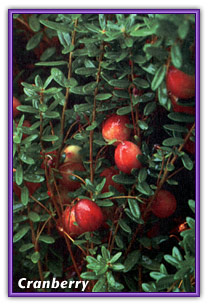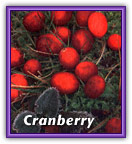 Source
Source
A low-growing shrub of the heath family with leathery leaves and astringent red berries, cranberry is familiar to all, particularly in holiday sauces. It grows in bogs from Newfoundland to Manitoba south to Virginia, Ohio, and Illinois. Most of the commercial berries are produced in Massachusetts and Wisconsin.
Traditional Use
Cranberries and their juice have long been regarded as folk treatments for urinary infections. In early American medicine, the crushed berries were applied to tumors and poulticed on wounds. The berries were recognized as a treatment for scurvy (a vitamin C deficiency) and dysentery.
Current Status
Although cranberry has long been described as a urinary antiseptic, there is no convincing evidence that cranberry juice acidifies the urine to the point of inhibiting the growth of bacteria. Recently, however, scientists discovered that cranberry juice and extracts prevent adhesion of E. coli bacteria to linings of the bladder and the gut, inhibiting their ability to colonize and cause infection. A recent study of elderly patients found that drinking 4 to 6 ounces of cranberry juice daily had a preventative, rather than curative, effect on urinary tract infections. In other studies the juice was effective as a urinary deodorant in bedridden patients with high levels of white blood cells and bacteria in the urine.
 Preparations
Preparations
Cranberry is best known in the form of whole fruit, jelled fruit, and juice. Cranberry juice cocktail is a 33 percent dilution of pure juice with added sugars for flavoring. Cranberry is also available as dietary supplements in the form of dried fruit, fruit concentrates, and juice concentrate in 800-mg capsules.
Cautions
If you suspect a urinary tract or kidney problem, see your doctor.
Symptoms
Urinary tract infections, mild

![]()
![]()
![]()
 Source
Source Preparations
Preparations